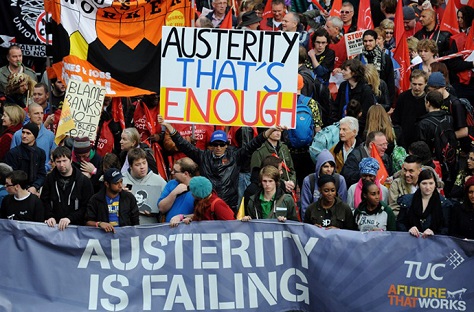Photo credit to AFP / Carl Court.
The one thing that both the Conservatives and Labour agree on in the 2015 election is that deficit reduction will be a priority for the United Kingdom’s next government.![]()
To that end, when you put aside the sideshow of the proposed European Union referendum, the red lines and pledges about the National Health Service, and the vagaries of coalition politics with Scottish nationalists or Northern Irish unionists, the central question of the British general election is how to bring the budget deficit down from around 5% of GDP today to 3% or less by the end of the next government’s scheduled term in 2020.
No matter who wins today’s election, though, the next British government will prioritize deficit reduction. Though Labour leader Ed Miliband and prime minister David Cameron have very different visions for how to accomplish that, that they both agree on this goal is notable for two reasons. First, it puts Miliband and Cameron in agreement in a way that former prime minister Gordon Brown and Cameron never were in the 2010 election. Second, it means that Miliband has largely agreed to wage the 2015 campaign on Cameron’s own territory. Miliband conceded, long before the general election campaign even began, the central premise of Cameron’s 2010 campaign and subsequent government.
When Cameron took power, the United Kingdom had a budget deficit of 11% of GDP, and the Tories quickly alleged that Great Britain faced a looming debt crisis as severe as Greece’s. That was hyperbole, of course — the British economy was never as fragile as Greece’s, and the British public debt was always far lower than Greece’s. In the kind of massive recession that accompanied the 2008-2009 financial crisis, government revenues fall and it’s not unexpected to see budget deficits rise. That’s doubly true if governments, such as Brown’s, continue to spend large amounts to boost aggregate demand — at a time when the private sector is shrinking, it’s standard neo-Keynesian policy to use expansive fiscal policy to help bridge the gap. Moreover, the Tory narrative gives Brown no credit for the substantial steps that Brown took to bring the world economy back from the brink between September 2008 and March 2009.
That’s not to say that Cameron didn’t have a point — rising public debt can reduce a government’s credibility over time, which means higher long-term borrowing costs. In 2013, the United Kingdom lost its ‘AAA’ credit rating, for example, as debt continued to rise and GDP growth only slowly resumed.
Nevertheless, over the course of 2014, Miliband increasingly shifted his strategy from opposing the ‘austerity’ economics that Cameron and his chancellor George Osborne implemented to bring the budget deficit under control. Instead of budget cuts, however, Miliband has argued that he can reduce the deficit with targeted tax increases and closing tax loopholes.
Labour manifesto highlights: eliminate ‘non-dom’ status, raise top tax rate from 45% to 50% and introduce ‘mansion tax’
Even as Miliband has pledged to raise the minimum wage to £8 by October 2019, introduce a rate freeze for railway prices, and reduce tuition fees from £9,000 down to £6,000 (the Tory-Lib Dem coalition had infamously raised fees from £3,000 in 2012), Labour’s manifesto proposes a series of measures to nibble at the UK tax structure.
For example, it wants to reverse the top income tax rate cut from 45% back to 50%.
It also wants to abolish the ‘non-dom’ loophole, which under current tax laws, the country treats non-domiciled residents of the United Kingdom with generous tax treatment by allowing them to choose whether to pay British taxes or taxes abroad. It’s an odd system that extends not only to the many foreign nationals who reside in the United Kingdom, but also in some cases to British citizens who live abroad and return.
Labour also wants to institute a ‘mansion tax’ on properties with a value of over £2 million, a nod to the idea that property values have risen sharply, especially in London.
Tory manifesto highlights: eliminate income tax for minimum wage workers, double child care allowance
Expect more of the same from a renewed Conservative mandate. For their part, the Tories have introduced several sweeteners in its own manifesto to ameliorate what would amount to a decade of budget cuts to public services. Among the most original is a pledge to eliminate income tax for anyone earning the minimum wage — it’s a half-step toward the kind of ‘negative income tax’ that would guarantee all citizens a basic income. Contrast that approach to the most recent Republican presidential campaign in the United States, where former Massachusetts governor Mitt Romney attracted controversy by disparaging 47% of the American electorate as paying no income tax and relying on government.
Moreover, the Tories have also promised to double the child care allowance for working parents of young children from 15 hours weekly to 30 hours weekly.
The Tories have also pledge to raise the threshold for the 40% tax rate from £42,385 to £50,000, which it estimates will exclude an additional 800,000 Britons from the 40% rate. It also wants to raise the personal income tax allowance (the British equivalent of the standard deduction) by around £2,000 to £12,500.
